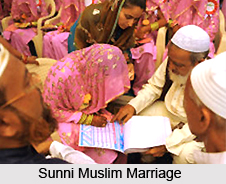Muslim matrimonial is celebrated with a lot of grandeur and happiness. In the olden days, the marriage ceremony would usually take place in the home of the bride or groom but recently, in order to accommodate all the guests, many Sunni Muslims are opting for banquets or halls for the ceremony. There is no particular Muhurat for the wedding so the date is usually fixed as per the convenience of both the families. No matter where the wedding takes place, Sunni Muslims participate eagerly in the all the wedding rituals right from pre-wedding to post wedding.
Wedding of Sunni Muslims
 An Islamic marriage ceremony is called a Nikah and it is officiated by a Maulvi or a priest called the Qazi. There are two distinct types of Muslims that include Shia and Sunni Muslims. Their wedding rituals, marriage traditions and overall concept of marriage is quite different. In a Shia marriage, the couple enters with a fixed-term plan where they part ways after the expiry date of the contract. On the contrary, Sunni weddings are more permanent and it is expected for the husband and wife to stay together all their life.
An Islamic marriage ceremony is called a Nikah and it is officiated by a Maulvi or a priest called the Qazi. There are two distinct types of Muslims that include Shia and Sunni Muslims. Their wedding rituals, marriage traditions and overall concept of marriage is quite different. In a Shia marriage, the couple enters with a fixed-term plan where they part ways after the expiry date of the contract. On the contrary, Sunni weddings are more permanent and it is expected for the husband and wife to stay together all their life.
The wedding ceremony involves signing the marriage contract and in Sunni Muslim weddings, two witnesses are required to complete the marriage. One of the largely practiced tradition in Sunni weddings is having the bride propose to the groom as per the tradition of Khadija where the Mohammad’s first wife proposed to the Prophet. The bride and groom also use the term ‘in the tradition of the Prophet I agree to…’. This implies their acknowledgement of the customs or Sunna of the Prophet which is a major component of the Sunni weddings.
Sunni Muslim Post Wedding traditions
Many of the post wedding traditions in Sunni Muslims are based on the life of the Mohammad and his community. Though these are not celebrated rituals, they are an important part of the religion and are followed strictly by all Sunni Muslims. Some of them include cutting one’s hair ceremonially after a visit to the Hajj, circumcision of a baby boy, celebrations after the birth of a child (called as aqiqa). Since Sunni Muslims follow the Sunna of Mohammad, most of these traditions are done in the presence of an Islamic scholar (also known as Imam). An Imam is not a priest or a rabbi in a cleric sense but is surely of high importance in various events in the life of a Sunni Muslim.
It may seem that life events that are considered sacraments in other faiths are not celebrated in a similar way in Islam. Many scholars have observed that potentially everything is sacred as per the Sunna of Mohammad and Muslims with this faith are known to have a model behaviour for all the daily activities of life.
Once a couple engages in Muslim matrimonial, they are bound by the customs of Sunni Muslims and they are known to add a sense of ceremony to various aspects of daily life in their marriage. Whether it is child birth, a religious trip to Hajj, the birth of a boy or an unlikely event of Talak, Sunnis will conduct all these life events with religious faith as per the Sunna of the Mohammad.
